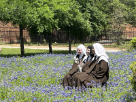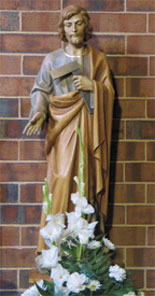
|
|
|
|
|
|
|
|
|
|
|
|
|
|
|
|
|
~ Silence and Solitude ~
|
||
|
Remaining in the Lord’s presence always, getting to be His close personal friend, is aided by the peaceful prayerful silence and solitude we find within our “cloister”, known as the Papal "This association of the contemplative life with the prayer of Jesus in a solitary place suggests a unique way of sharing in Christ's relationship with the Father. The Holy Spirit, who led Jesus into the desert (cf. Lk 4:1), invites the nun to share the solitude of Christ Jesus, who “with the eternal Spirit” (Heb 9:14) offered himself to the Father. The solitary cell, the closed cloister, are the place where the nun, bride of the Incarnate Word, lives wholly concentrated with Christ in God. The mystery of this communion is revealed to her to the extent that, docile to the Holy Spirit and enlivened by his gifts, she listens to the Son (cf. Mt 17:5), fixes her gaze upon his face (cf. 2 Cor 3:18), and allows herself to be conformed to his life, to the point of the supreme self-offering to the Father (cf. Phil 2:5 ff.), for the praise of his glory. The enclosure therefore, even in its physical form, is a special way of being with the Lord, of sharing in “Christ's emptying of himself by means of a radical poverty, expressed in ... renunciation not only of things but also of "space", of contacts, of so many benefits of creation”, (12) at one with the fruitful silence of the Word on the Cross. It is clear then that “withdrawal from the world in order to dedicate oneself in solitude to a more intense life of prayer is nothing other than a special way of living and expressing the Paschal Mystery of Christ”. (13) It is a true encounter with the Risen Lord, a journey in ceaseless ascent to the Father's house." (Verbi Sponsa)
|
|
|
Homepage ~ Links ~ Contact Us
Discalced Carmelite Nuns
5801 Mt. Carmel Drive
Arlington, Texas 76017
Email: arcarmel@ix.netcom.com
Web site: www.carmelnuns.com

 Enclosure. Once we enter, we do not leave the monastery grounds except for necessary medical care... nor does anyone else come inside the cloister except for necessary maintenance. But the walls, the grilles, the hiddenness do not cut us off from the sufferings of the world or mean that we fail to appreciate its good and beautiful values; rather our unique vantage point lets us penetrate into the very heart of things. We are free... free to reflect, to ponder life in
Enclosure. Once we enter, we do not leave the monastery grounds except for necessary medical care... nor does anyone else come inside the cloister except for necessary maintenance. But the walls, the grilles, the hiddenness do not cut us off from the sufferings of the world or mean that we fail to appreciate its good and beautiful values; rather our unique vantage point lets us penetrate into the very heart of things. We are free... free to reflect, to ponder life in  the light of God’s Word, to concentrate on love. If by our Solemn Vows of poverty, chastity and obedience we give up good things like the right to marriage and a family of our own, to be independent and seek our own ambitions, to own property or to have a rewarding career in the world, it is only to free us to have and to do something even more rewarding.
the light of God’s Word, to concentrate on love. If by our Solemn Vows of poverty, chastity and obedience we give up good things like the right to marriage and a family of our own, to be independent and seek our own ambitions, to own property or to have a rewarding career in the world, it is only to free us to have and to do something even more rewarding.